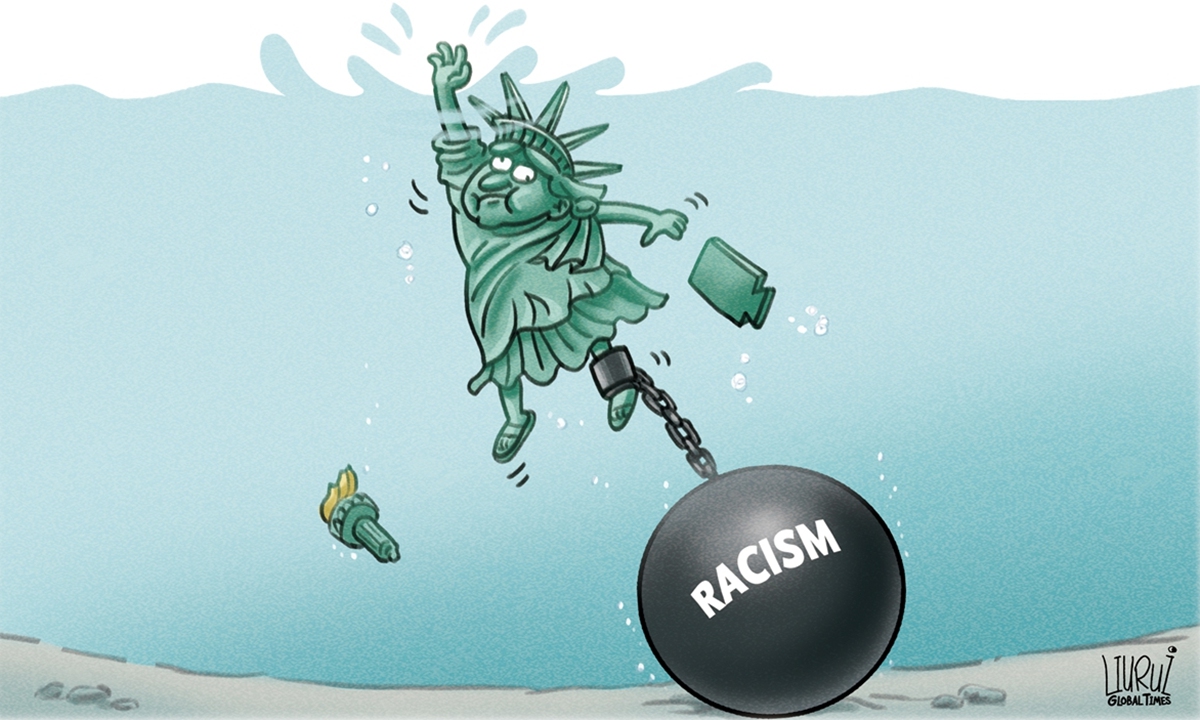
Illustration: Liu Rui/GT
As extremist politicians and public opinion from the US continue to amplify their anti-China rhetoric and actions, this has caused people to worry: Are the discriminatory exclusion laws against the Chinese people, similar to the Chinese Exclusion Act, possibly making a comeback to the US? While experts agreed that such a possibility is quite low at the federal level, they, however, warn against a growing trend of "Chinese exclusion" in US society.
This Sunday marks the 80th anniversary of the repeal of the Chinese Exclusion Act. Signed into law in 1882, the Act blocked Chinese workers from legally entering the US and Chinese immigrants who were already living there from becoming US citizens. It is a dark and sordid chapter in the history of immigration, the rule of law and human rights in the country.
The White House released a statement on Sunday in which US President Joe Biden remembered the victims, honored Chinese-Americans and warned against those who still "demonize immigrants and fan the flames of intolerance." Although he also criticized the Chinese Exclusion Act for "weaponizing our immigration system to discriminate against an entire ethnic group," his words are nothing more than another cookie-cutter White House statement amid the worsening environment for US ethnic minorities.
In fact, against the backdrop of the upcoming presidential election, they sound more like a campaign ad aimed at attracting the votes of ethnic minorities, especially those of Asian and Chinese heritage, rather than a genuine call for eliminating racial discrimination, according to experts.
However, no matter who is in office, the US president cannot disperse the thick, filthy smog of racism shrouding the US. Even though the Chinese Exclusion Act was repealed eight decades ago, the belief in the "yellow peril" still persists in US politics and culture.
Ji Hong, a research fellow at the Institute of American Studies of the Chinese Academy of Social Sciences, believes that today, discrimination against communities of Asian and Chinese heritage in US society has not weakened. Especially during the COVID-19 epidemic, these people were extremely demonized in the US and even became victims of hate crimes due to their race and ethnicity.
A recent Pew Research Center survey shows that discrimination experiences shape most Asian Americans' lives, with 78 percent of Asian adults saying they have been treated as foreigners in some way, even if they were born in the US. According to another study in April, nearly three-quarters of Chinese Americans have experienced racial discrimination in the past 12 months. These are all evidence that the tumor of racism against Asians and Chinese is still spreading rapidly in today's US.
The legacy of the Chinese Exclusion Act, a seeming relic of the past, is still echoing today. The Act was concocted by US politicians to cater to the xenophobic and Sinophobic sentiments spreading in the country. As time passed by, it seems that little has changed. In recent years, some US politicians have been hyping anti-China issues and inciting anti-China sentiments for their own political gains.
As a result, more than 20 states in the US have proposed or enacted legislation restricting Chinese purchases of land, buildings and homes, citing concerns about so-called threats to national security. From these specific measures on the state level, to the witch hunt of Chinese scientists and indiscriminate hate crimes against Asians and Chinese, it is alarming to see the "Chinese exclusion" tendency gradually proliferate from the economic to the social level and from sporadic incidents to the entire community in the US.
Any sentiment that excludes an ethnic group in society is a serious departure from equality that the US promotes. The existence of the Chinese Exclusion Act is evidence that the US is in no position to talk about human rights and freedom.
Besides, as the "Chinese exclusion" sentiment in the US is justified by some extremist politicians under the pretext of the so-called national security threats, it may drive US society to believe this sentiment is inevitable and right. Once the incidents against Chinese individuals - be they Chinese citizens or Chinese-Americans - continue to skyrocket, the US will become a crazy extremist country.




